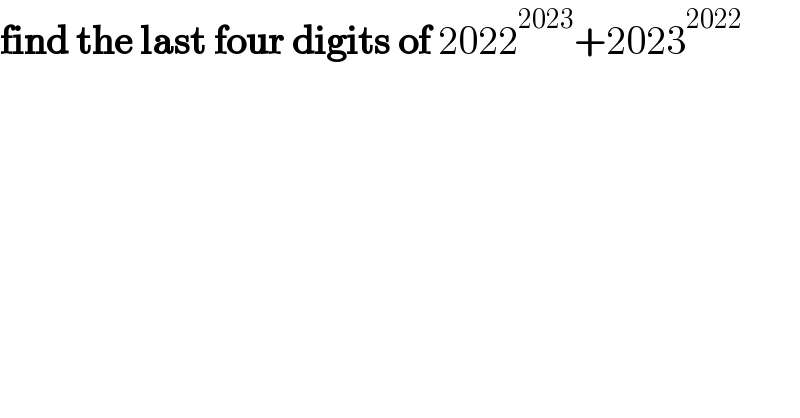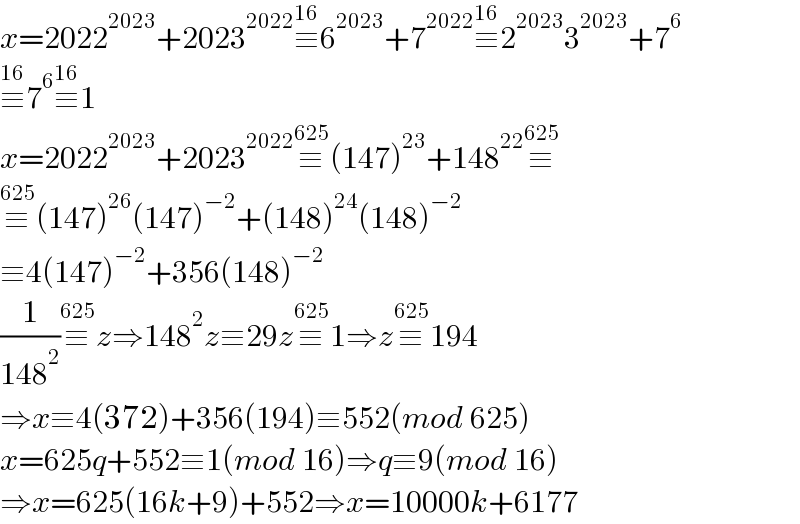
Question Number 203192 by MrGHK last updated on 12/Jan/24

$$\boldsymbol{\mathrm{find}}\:\boldsymbol{\mathrm{the}}\:\boldsymbol{\mathrm{last}}\:\boldsymbol{\mathrm{four}}\:\boldsymbol{\mathrm{digits}}\:\boldsymbol{\mathrm{of}}\:\mathrm{2022}^{\mathrm{2023}} +\mathrm{2023}^{\mathrm{2022}} \\ $$
Answered by deleteduser1 last updated on 12/Jan/24

$${x}=\mathrm{2022}^{\mathrm{2023}} +\mathrm{2023}^{\mathrm{2022}} \overset{\mathrm{16}} {\equiv}\mathrm{6}^{\mathrm{2023}} +\mathrm{7}^{\mathrm{2022}} \overset{\mathrm{16}} {\equiv}\mathrm{2}^{\mathrm{2023}} \mathrm{3}^{\mathrm{2023}} +\mathrm{7}^{\mathrm{6}} \\ $$$$\overset{\mathrm{16}} {\equiv}\mathrm{7}^{\mathrm{6}} \overset{\mathrm{16}} {\equiv}\mathrm{1} \\ $$$${x}=\mathrm{2022}^{\mathrm{2023}} +\mathrm{2023}^{\mathrm{2022}} \overset{\mathrm{625}} {\equiv}\left(\mathrm{147}\right)^{\mathrm{23}} +\mathrm{148}^{\mathrm{22}} \overset{\mathrm{625}} {\equiv} \\ $$$$\overset{\mathrm{625}} {\equiv}\left(\mathrm{147}\right)^{\mathrm{26}} \left(\mathrm{147}\right)^{−\mathrm{2}} +\left(\mathrm{148}\right)^{\mathrm{24}} \left(\mathrm{148}\right)^{−\mathrm{2}} \\ $$$$\equiv\mathrm{4}\left(\mathrm{147}\right)^{−\mathrm{2}} +\mathrm{356}\left(\mathrm{148}\right)^{−\mathrm{2}} \\ $$$$\frac{\mathrm{1}}{\mathrm{148}^{\mathrm{2}} }\overset{\mathrm{625}} {\equiv}{z}\Rightarrow\mathrm{148}^{\mathrm{2}} {z}\equiv\mathrm{29}{z}\overset{\mathrm{625}} {\equiv}\mathrm{1}\Rightarrow{z}\overset{\mathrm{625}} {\equiv}\mathrm{194} \\ $$$$\Rightarrow{x}\equiv\mathrm{4}\left(\mathrm{372}\right)+\mathrm{356}\left(\mathrm{194}\right)\equiv\mathrm{552}\left({mod}\:\mathrm{625}\right) \\ $$$${x}=\mathrm{625}{q}+\mathrm{552}\equiv\mathrm{1}\left({mod}\:\mathrm{16}\right)\Rightarrow{q}\equiv\mathrm{9}\left({mod}\:\mathrm{16}\right) \\ $$$$\Rightarrow{x}=\mathrm{625}\left(\mathrm{16}{k}+\mathrm{9}\right)+\mathrm{552}\Rightarrow{x}=\mathrm{10000}{k}+\mathrm{6177} \\ $$
Commented by MrGHK last updated on 13/Jan/24

$${thanks} \\ $$
Commented by MathematicalUser2357 last updated on 15/Jan/24

$${q}+\mathrm{552} \\ $$$${read}\:{the}\:{blue}\:{one} \\ $$
